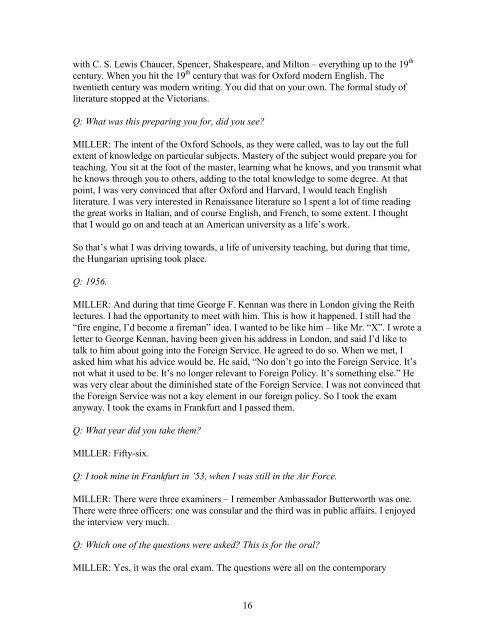1 The Association for Diplomatic Studies and Training Foreign ...
1 The Association for Diplomatic Studies and Training Foreign ...
1 The Association for Diplomatic Studies and Training Foreign ...
Create successful ePaper yourself
Turn your PDF publications into a flip-book with our unique Google optimized e-Paper software.
with C. S. Lewis Chaucer, Spencer, Shakespeare, <strong>and</strong> Milton – everything up to the 19 th<br />
century. When you hit the 19 th century that was <strong>for</strong> Ox<strong>for</strong>d modern English. <strong>The</strong><br />
twentieth century was modern writing. You did that on your own. <strong>The</strong> <strong>for</strong>mal study of<br />
literature stopped at the Victorians.<br />
Q: What was this preparing you <strong>for</strong>, did you see?<br />
MILLER: <strong>The</strong> intent of the Ox<strong>for</strong>d Schools, as they were called, was to lay out the full<br />
extent of knowledge on particular subjects. Mastery of the subject would prepare you <strong>for</strong><br />
teaching. You sit at the foot of the master, learning what he knows, <strong>and</strong> you transmit what<br />
he knows through you to others, adding to the total knowledge to some degree. At that<br />
point, I was very convinced that after Ox<strong>for</strong>d <strong>and</strong> Harvard, I would teach English<br />
literature. I was very interested in Renaissance literature so I spent a lot of time reading<br />
the great works in Italian, <strong>and</strong> of course English, <strong>and</strong> French, to some extent. I thought<br />
that I would go on <strong>and</strong> teach at an American university as a life’s work.<br />
So that’s what I was driving towards, a life of university teaching, but during that time,<br />
the Hungarian uprising took place.<br />
Q: 1956.<br />
MILLER: And during that time George F. Kennan was there in London giving the Reith<br />
lectures. I had the opportunity to meet with him. This is how it happened. I still had the<br />
“fire engine, I’d become a fireman” idea. I wanted to be like him – like Mr. “X”. I wrote a<br />
letter to George Kennan, having been given his address in London, <strong>and</strong> said I’d like to<br />
talk to him about going into the <strong>Foreign</strong> Service. He agreed to do so. When we met, I<br />
asked him what his advice would be. He said, “No don’t go into the <strong>Foreign</strong> Service. It’s<br />
not what it used to be. It’s no longer relevant to <strong>Foreign</strong> Policy. It’s something else.” He<br />
was very clear about the diminished state of the <strong>Foreign</strong> Service. I was not convinced that<br />
the <strong>Foreign</strong> Service was not a key element in our <strong>for</strong>eign policy. So I took the exam<br />
anyway. I took the exams in Frankfurt <strong>and</strong> I passed them.<br />
Q: What year did you take them?<br />
MILLER: Fifty-six.<br />
Q: I took mine in Frankfurt in ’53, when I was still in the Air Force.<br />
MILLER: <strong>The</strong>re were three examiners – I remember Ambassador Butterworth was one.<br />
<strong>The</strong>re were three officers: one was consular <strong>and</strong> the third was in public affairs. I enjoyed<br />
the interview very much.<br />
Q: Which one of the questions were asked? This is <strong>for</strong> the oral?<br />
MILLER: Yes, it was the oral exam. <strong>The</strong> questions were all on the contemporary<br />
16
















